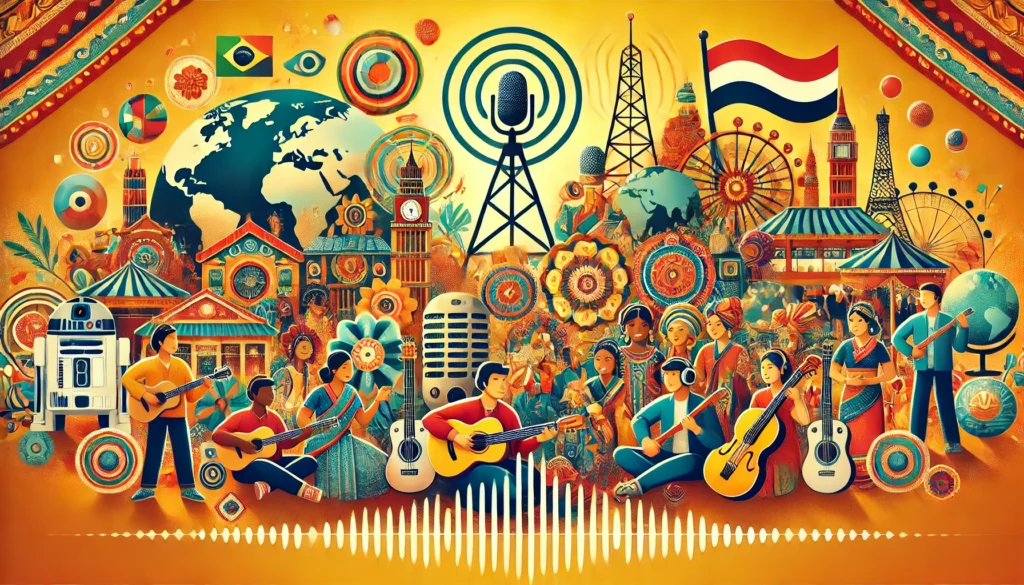In a world of growing digital connectivity, radio (/interworldradio.net) has stood the test of time as one of the most powerful media platforms for sharing stories, cultures, and ideas. Whether it’s news, entertainment, or music, radio remains an intimate, real-time way to connect with audiences worldwide. Among these innovative platforms is Interworld Radio, a unique station dedicated to bridging cultural divides and offering a stage for voices across the globe. The motto “Tune in to a spectrum of voices, cultures, and stories from around the globe” sums up Interworld Radio’s mission perfectly: to create a space where listeners can explore the diverse rhythms of the world.
This article dives deep into what makes Interworld Radio a distinct platform, the role of radio in a globalized world, the importance of cross-cultural communication, and the potential impact of such a platform on social and environmental issues. We’ll explore how it connects people from different walks of life and why its approach to storytelling is essential in today’s fragmented media landscape – /interworldradio.net.
The Legacy of Radio as a Cultural Medium
For decades, radio has been an essential tool for news dissemination, cultural expression, and entertainment. Long before the internet and television, radio waves carried voices and sounds into people’s homes, providing a lifeline for education, information, and connection. Unlike other forms of media, radio has an immediacy and intimacy that can create a sense of shared experience, even among distant listeners.
Radio stations have historically been the platform for music discovery, bringing together local sounds and global genres. Additionally, community radio stations have been critical for smaller groups to express their narratives, often becoming an essential tool for political movements and cultural revolutions – /interworldradio.net.
As we shift into an era dominated by streaming platforms and social media, radio continues to thrive, especially in regions where the internet is limited. It remains an accessible medium that can reach remote areas and marginalized communities. Furthermore, the rise of online radio (/interworldradio.net) platforms such as Interworld Radio exemplifies the evolving nature of radio in the digital age.
Interworld Radio: A Truly Global Experience
At its core, Interworld Radio seeks to break through geographical, linguistic, and cultural barriers. The platform stands out for its ability to broadcast stories, music, and cultural content that reflect the vast diversity of our planet. It serves as a window into the lives of people who may otherwise remain unheard or invisible to mainstream media – /interworldradio.net.
- A Global Voice: Interworld Radio provides a platform for voices from all walks of life. Whether it’s a rural farmer in Kenya discussing climate change, a street musician in Brazil sharing their latest composition, or an activist in Southeast Asia raising awareness about deforestation, Interworld Radio brings these narratives to a global audience. This gives listeners the chance to understand different perspectives, enhancing empathy and global solidarity.
- Music as a Universal Language: Music is a key feature of the station’s programming. With genres ranging from traditional folk music to contemporary electronic beats, Interworld Radio (/interworldradio.net) explores the diverse sounds of the world. For instance, listeners might tune into a session of Gamelan music from Indonesia followed by Afrobeat rhythms from West Africa, showcasing the rich cultural tapestry of global music traditions.
- Storytelling Across Cultures: Interworld Radio (/interworldradio.net) believes in the power of storytelling as a tool for cultural understanding. Each show, podcast, or interview is curated to highlight not just a culture’s similarities but its uniqueness. This allows listeners to appreciate the nuances of different societies. It also serves as an educational tool, helping bridge the gap between diverse cultural backgrounds.
- Empowering Local Voices: In many parts of the world, local voices are often overshadowed by global media conglomerates. Interworld Radio actively seeks out partnerships with grassroots organizations, community radio stations, and individual creators to amplify those voices. Whether it’s covering local elections in Bolivia or a feature on indigenous food practices in the Arctic, the station offers a platform that is inclusive and representative – /interworldradio.net.
- Accessible Anywhere: The digital format of Interworld Radio allows for easy access no matter where you are. Its streaming services are available across devices, making it possible for anyone with an internet connection to tune in. This accessibility is crucial in an era where more people are consuming media on their phones or laptops.
The Role of Radio in a Globalized World
In today’s interconnected world, the role of radio has expanded beyond entertainment and news. It has become a tool for fostering dialogue between cultures, providing information in crisis situations, and raising awareness about global issues – /interworldradio.net.
1. Radio as a Bridge Between Cultures
One of the most exciting aspects of globalization is the exchange of culture. However, this exchange often gets dominated by a few voices, leaving many underrepresented cultures struggling to maintain their heritage. Interworld Radio plays a crucial role in keeping these voices alive, presenting a more diverse range of cultural experiences.
By broadcasting shows in multiple languages and focusing on regional content, the station enables a deeper understanding of the nuances that shape various cultural identities. This can lead to cultural preservation and promote diversity as a key strength in global dialogue – /interworldradio.net.
2. Radio as a Tool for Crisis Communication
Radio has long been the go-to medium for crisis communication, especially in regions where internet access may be disrupted during emergencies. Natural disasters, conflicts, and pandemics can isolate communities from crucial information, but radio can still reach them. Interworld Radio recognizes the importance of providing timely and accurate information during such events.
For example, during the COVID-19 pandemic, the station provided multilingual broadcasts that offered health updates, safety protocols, and public health information to audiences that might not have had access to reliable internet services – /interworldradio.net.
3. Amplifying Environmental Awareness
Global environmental issues such as climate change, deforestation, and biodiversity loss are some of the most pressing concerns of our time. However, these issues are experienced differently across various regions. Interworld Radio has made environmental reporting a cornerstone of its mission by covering environmental stories from all corners of the globe – /interworldradio.net.
Through partnerships with environmental NGOs, activists, and local communities, the station sheds light on how specific regions are grappling with climate change. For instance, the platform might highlight the plight of indigenous communities in the Amazon fighting against illegal logging or feature a coastal community in the Philippines adapting to rising sea levels.
This grassroots reporting not only raises awareness but also promotes solutions that are grounded in local knowledge and sustainable practices – /interworldradio.net.
4. Fostering Global Dialogue
In an era of political polarization and media fragmentation, fostering global dialogue is more important than ever. Platforms like Interworld Radio (/interworldradio.net) create opportunities for people from different backgrounds to engage in conversations about the most critical issues of our time.
Through panel discussions, interviews, and listener call-ins, the station invites people to share their views and learn from one another. Whether it’s a discussion on human rights, gender equality, or technological advancements, these conversations break down the barriers of distance and difference – /interworldradio.net.
The Future of Global Radio
As digital technology continues to evolve, so too will the ways we engage with radio. The future of platforms like Interworld Radio will likely be shaped by several key trends – /interworldradio.net:
- Increased Interactivity: Radio is becoming increasingly interactive, with listeners engaging in real-time through social media, chat rooms, and even live-streamed video. This interactivity fosters a sense of community among listeners and gives them the chance to participate in the conversation.
- Personalization: As streaming platforms use algorithms to tailor content to individual tastes, radio stations will likely adopt similar technology. This could lead to more personalized listening experiences, with audiences receiving content that aligns with their interests while still exposing them to new and diverse perspectives.
- Collaborative Storytelling: Crowdsourcing content and collaborations across cultures will become a growing trend in radio. The future of radio might see more participatory storytelling, where listeners contribute their own experiences and perspectives, enriching the global conversation.
- Sustainability and Social Impact: As more people seek to make responsible choices about the media they consume, platforms that prioritize sustainability and social impact will gain prominence. Interworld Radio, with its focus on environmental and social issues, is well-positioned to continue leading this movement.
Conclusion
Interworld Radio is much more than just a radio station; it’s a platform for global storytelling, cultural exchange, and environmental awareness. By offering a space for diverse voices and perspectives, it bridges gaps and fosters understanding in an increasingly interconnected world – /interworldradio.net.
As the digital landscape continues to evolve, the future of radio looks bright, with exciting opportunities for greater interactivity, personalization, and social impact. Interworld Radio is at the forefront of this transformation, providing a model for how media can bring people together across borders and cultures. In a time when divisiveness often makes headlines, platforms like Interworld Radio remind us of the power of shared stories and collective action – /interworldradio.net.
FAQs
1. What is Interworld Radio? Interworld Radio is an online radio platform that broadcasts a diverse range of global content, including music, storytelling, and discussions from different cultures and perspectives around the world.
2. How can I access Interworld Radio? Interworld Radio is accessible online through its website and streaming services. You can listen via any internet-enabled device, such as a computer, smartphone, or tablet.
3. What type of content does Interworld Radio focus on? Interworld Radio focuses on cultural exchange, environmental awareness, and global storytelling. Its programming includes music from around the world, interviews, community stories, and discussions on global issues such as climate change, social justice, and human rights.
4. How does Interworld Radio support local communities? Interworld Radio partners with grassroots organizations, community radio stations, and local content creators to amplify their voices and stories on a global scale. It empowers underrepresented communities by providing them with a platform to share their experiences and perspectives.
5. Can I contribute to Interworld Radio as a listener? Yes! Interworld Radio encourages interactivity and engagement from its listeners. You can participate by sending in your stories, opinions, or music, and by joining live discussions or social media conversations.
6. How does Interworld Radio address environmental issues? Interworld Radio frequently broadcasts environmental content, highlighting local and global efforts to combat climate change and environmental degradation. The station partners with environmental organizations and activists to bring these stories to a wider audience.







